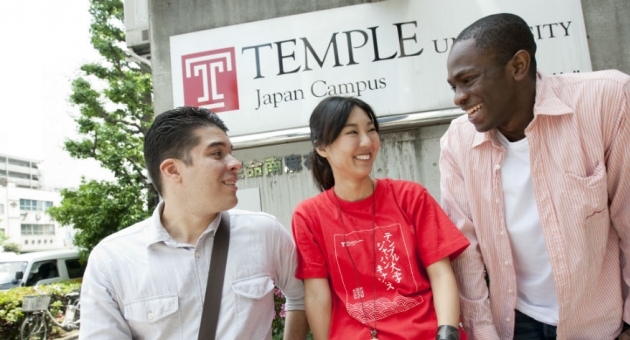Freeman Foundation East Asia internship program helps students soar in Japan

You can learn Japanese in class and study Japanese culture, but navigating Japan’s subway system for the first time when you touch down in Tokyo is when it truly hits you that you are on the other side of the world.
Jordan Sievers, TFM ’14, a Freeman Foundation scholarship recipient, went to Tokyo when he was a senior in fall 2013. “It was my first time on a plane and in an airport,” he recalled. “And I had to figure out how to use the Japanese train system by myself, right out of the gate, as soon as I landed.”
Approximately 60 students study at Temple University Japan (TUJ) each semester. Classes are small, each with about 20 students. Many students also elect to intern while they are there.
The Freeman Foundation scholarship, which was created in summer 2013, awards study abroad students up to $3,000 each to encourage students from the U.S. to intern in East Asia. To be eligible, undergraduate students must be U.S citizens enrolled full time and be in good academic and disciplinary standing. They also must perform a three-credit internship during their scholastic term.
Kristyne Allen, Class of 2015, studied Japanese for two years before her trip in fall 2013. She interned as a teachers assistant at Kanagawa Shogoh High School, where she tutored and helped teachers during class.
“I got to eat typical Japanese high school lunches—which are crazy delicious and made to order, kind of like food trucks on Main Campus,” she explained. “The best thing was exploring the everyday parts of Japan by walking around Tokyo and Kanagawa.“
The TUJ program gave Sievers hands-on experience in film and media arts. “For one of my classes, I got to write and direct a short film,” he said. “I did it in Japanese, with Japanese actors and a Japanese-influenced story. It came out pretty well. It won the TUJ film festival.”
Denise Connerty, assistant vice president for education abroad and overseas campuses, said that studying abroad and being immersed in another culture is “not better or worse, just different.”
That difference was underscored for both Sievers and Allen when they returned to the U.S. “It was a lot more shocking to come back to America from Japan than it was to go to Japan from America,” Sievers said. “You get used to the Japan way. It’s clean and organized. Here, for example, on the escalators, it’s a free-for-all. In Japan, it’s always on the left side.”
Allen noticed the difference in noise level. “The U.S. suddenly became so much louder. People are always talking over top of each other. It was amazing to come back and be hit with this wall of noise. But it was comforting that I did not have to translate everything anymore.”
Studying abroad also changed the trajectory of Sievers’ life. “I loved my time there so much that I could see myself living there permanently,” he said. Sievers recently secured a job in Japan teaching English in early 2015, so he’ll be heading back in the new year.
—Anna Goldfarb